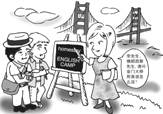网址:http://m.1010jiajiao.com/timu_id_825723[举报]
| |||||||||||||||||||||||||||||||||||||||||||||||||||||||||||||||||||||||||
Early in the twentieth century, two famous scientists developed their personal ideas about dreams. Austrian psychiatrist Sigmund Freud published a book called “The Interpretation(诠释) of Dreams” in 1900. Freud believed people often dream about things they want but can’t have. These dreams often have something to do with sex and aggression(侵犯). Swiss psychiatrist Carl Jung worked closely with Freud for several years, but he believed dreams could help people grow and understand themselves. He believed dreams provide solutions(解答) to problems we face when we are awake. He didn’t believe dreams hide our feelings about sex or aggression. Today we know more about the science of dreaming because researchers can take pictures of people’s brains while they are sleeping.
Other researchers are studying how dreaming helps our bodies work with problems and very sad emotions(感情). Robert Stickgold is a professor of psychiatry at Harvard University in Massachusetts. Doctor Stickgold says that when we dream, the brain is trying to make sense of the world. He does not agree with Sigmund Freud that dreaming is the way we express our hidden feelings and desires(愿望).
Scientists believe it is important to keep researching dreams. Doctor Stickgold says it has been more than one hundred years since Sigmund Freud published his important book about dreaming. Yet there is still no agreement on exactly how the brain works when we are dreaming or why we dream.
请根据短文内容,选择最佳答案, 将其标号在答题卡上涂黑。(每小题2分,共10分)
【小题1】 Dreams _________.
| A.are remembered by everyone |
| B.express all that we think in our mind |
| C.include few senses and things we touch |
| D.are sometimes nightmares that repeat and frighten us |
| A.Sigmund Freud | B.Robert Stickgold | C.Carl Jung | D.the writer |
| A.believe dreams can help people understand all the problems that they face |
| B.think dreams always hide someone’s feelings about sex or aggression |
| C.study dream and dreaming and have their own ideas |
| D.have the same idea that people often dream about the things they want |
| A.Jung thought that dreams provide solutions to problems we face when we are sleeping |
| B.Freud developed the idea that dreams are expressions of people’s hidden feelings |
| C.scientists have known quite well why we dream because they can take pictures of our brains |
| D.other researchers have discovered how dreaming helps our bodies work with problems and very sad emotions |
| A.The Explanations of Dreams | B.The Ways of Dreams |
| C.The Solutions to Dreams | D.The Mystery(奥秘) of Dreams and Dreaming |
Most teachers agree that the first lesson of a teacher is often unforgettable.I remember getting into the class with the 1 of a beginner teacher: nervous, careful, excited…etc.The school I 2 my first lesson in was well-known to hold the most troublesome (顽皮的)students in the city.With this in 3 , I was more nervous than I should be.But I tried my best not to 4 it out and went into the class.The first thing I did was taking a look at the whole class.My eyes 5 on a big black student.He was sitting in the back 6 of the class with no one in front of him.His body was much 7 than mine.I thought it would be better to 8 that boy untouchable.As soon as I started my lesson writing on the blackboard, I heard some noise from the back.I 9 the students to find out who did it, but the class looked very 10 .I went on writing and the noise went on.Then I stopped my lesson to 11 this problem because I believed that if I lost control of the class from the 12 I wouldn’t be able to get it back.I thought the big boy made the noise.To my 13 , a small boy was the source (根源)of trouble.Days went 14 and I discovered that the big boy was good and quiet and the great source of trouble came from a group of 15 students who became under control after some weeks.From then on, I realized that judging (判断)by appearance can often be wrong, not only with students!

1.A.ideas B.feelings C.thoughts D.ways
2.A.started B.found C.opened D.finished
3.A.head B.mind C.school D.hand
4.A.make B.bring C.work D.show
5.A.stopped B.noticed C.pointed D.warned
6.A.line B.row C.room D.part
7.A.higher B.lighter C.larger D.thicker
8.A.let B.relax C.increase D.leave
9.A.faced B.wondered C.discussed D.described
10.A.common B.confident C.quiet D.crowded
11.A.decide B.solve C.improve D.produce
12.A.beginning B.example C.matter D.end
13.A.competition B.congratulation C.surprise D.difference
14.A.out B.down C.away D.on
15.A.small-sized B.comfortable
C.frustrated D.ordinary-looking
查看习题详情和答案>>
| |||||||||||||||||||||||||||||||||||||||||||||||||||||||||||||||||||||||||||||||||||||||||||||||||||||||||||||||||||||||||||||||||||||||||||||||||||||||||||||||||||||||||||||||||||||||||||||||||||||||||||||||||||||